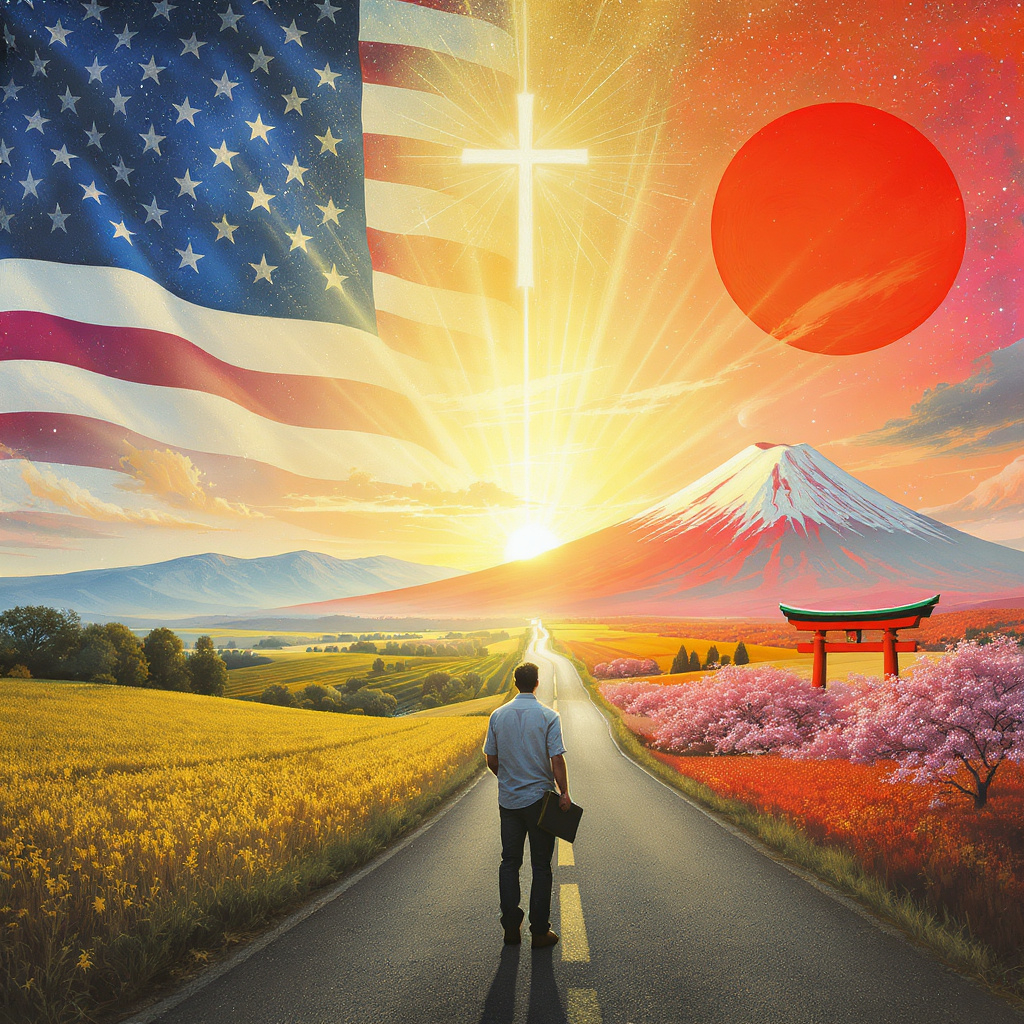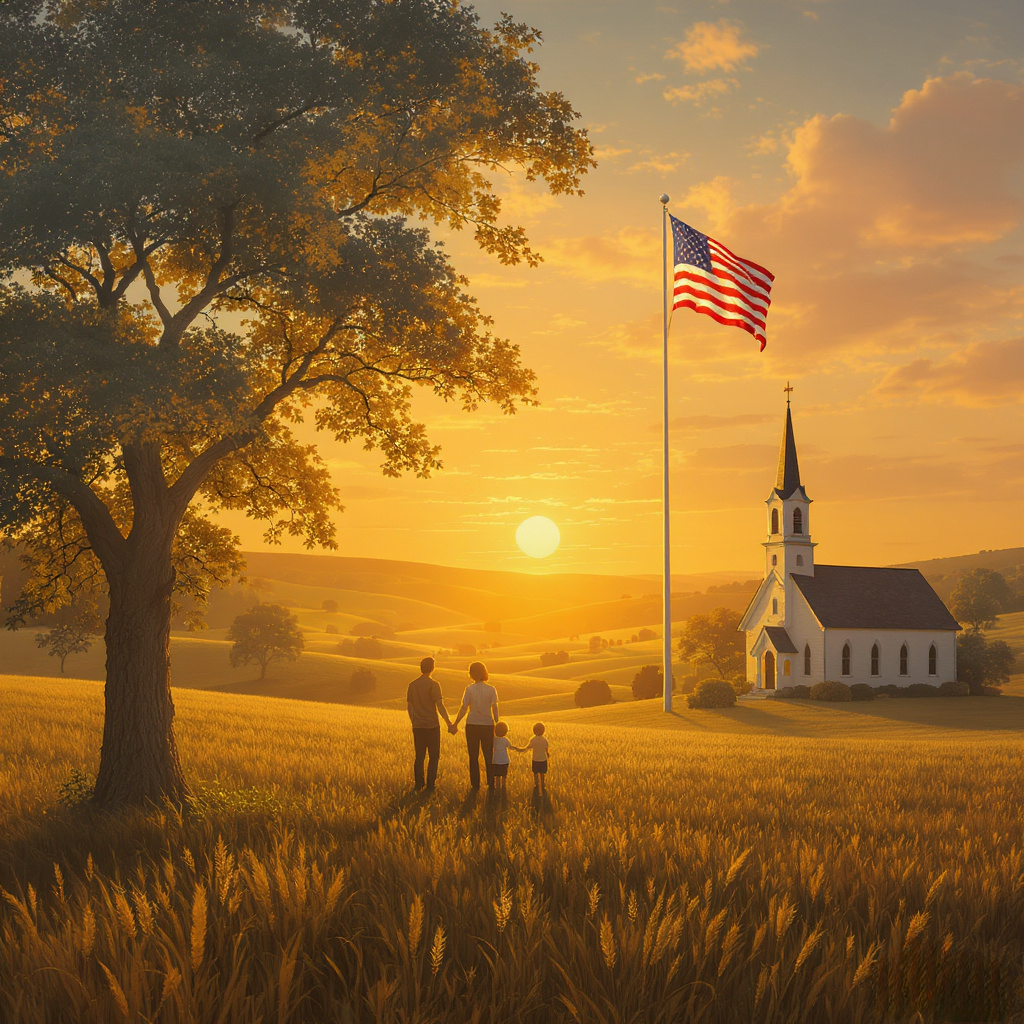Citizens of Heaven: Rethinking Patriotism in a Global Gospel, Part 1
Posted on 09/08/2025 at The Curmudgeon’s Chronicle

From Frustration to Calling
I’m tired. Not the kind of tired from a long day’s work or a sleepless night, but the soul-deep exhaustion of watching something you love – your faith, your country – get tangled in rhetoric that doesn’t sit right. A few weeks ago, I fired off a post on X in response to a man I consider a brother in Christ. His words, cloaked in Christian conviction, leaned into a patriotism that felt more like a fortress than a light. It wasn’t just his vague calls to “protect our heritage” or prioritize “our people” that got under my skin. It was their echo of something darker – whispers of the racial purism I’ve heard from voices like Corey Mahler and Ryan Dumperth of Stone Choir. I couldn’t stay silent.
But here’s the thing: I love America. I was born here, raised in its small-town rural communities, next to wide-open farmlands and in the shadow of majestic mountain ranges, shaped by its small-town churches. I’ve saluted the flag, teared up at the national anthem, and felt the pride of belonging to a nation that, for all its flaws, has been a beacon of freedom and opportunity. So why am I packing my bags, preparing to move my family to Japan in the next one to two years? Why trade the Stars and Stripes for a calling half a world away? It’s not because I’ve stopped loving my country. It’s because I’ve been gripped by a deeper citizenship – one not bound by borders or bloodlines but by a gospel that’s global.

Philippians 3:20 says, “For our conversation [commonwealth, state] is in heaven; from whence also we look for the Saviour, the Lord Jesus Christ.” That verse has been my anchor through this tension, a steady reminder that my true home isn’t bound by borders. It’s forced me to wrestle with what it means to love my country without making it an idol, to hold my patriotism loosely while clinging tightly to Christ. It’s why my family and I are answering a call to plant churches in Japan, where less than 1% know Jesus, according to Joshua Project’s latest data. This move isn’t a rejection of America but an embrace of something bigger – a mission to see every tribe and tongue in God’s redemptive story (Rev. 7:9).
This journey didn’t start with a grand epiphany – it began with a growing unease. I’ve spent years in Christian circles where patriotism and faith are woven together, a blend I once celebrated. But as I encountered voices like Steven Wolfe, whose Christian nationalist vision emphasizes cultural identity over gospel unity, I felt a knot tighten. Wolfe’s framework, echoed by figures like Joel Webbon and Brian Sauvé, seems to exalt a nation’s heritage in ways that clash with Scripture. In his book The Case for Christian Nationalism, Wolfe argues that nations should reflect a unified cultural and ethnic mold, a view that seems to shift our faith toward guarding earthly identities rather than building God’s kingdom. Consider the diversity of the early church (Acts 17:26, “hath made of one blood all nations of men…”), or Scriptural commands to love the stranger (Lev. 19:34, “thou shalt love him as thyself…”) and break down ethnic divides (Gal. 2:11, “I withstood him to the face…”).
I’m torn, if I’m honest. Part of me wants to tread lightly, to honor the good intentions of brothers and sisters who love their country and their faith. I get it – I feel that love too. But another part of me wants to grab a megaphone and call out the drift toward tribalism that I see in some corners of the church. I could hit hard, like a ton of bricks, especially when I think about voices like Mahler’s that twist scripture to justify racial purism. But I know that’s not the way to start this conversation. I want you to hear my heart first – my love for America, my grief over its divisions, and my hope for a gospel that transcends it all.
That’s where Japan comes in. When God called me to this mission, it wasn’t an escape from America’s problems. It was a chance to live out what I believe: that our heavenly citizenship reshapes how we love our earthly homes. Japan, with its rich culture and spiritual hunger, isn’t just a destination; it’s a reminder that God’s heart is for every nation. Moving there doesn’t mean I’m abandoning my roots. It means I’m carrying them into a broader story, one where the gospel builds bridges, not walls.

I think of the recent protests in Los Angeles (June 8-10, 2025, AP News), where Mexican flags waved alongside calls for justice. Some saw those flags as a threat, a symbol of division, but I saw them as a reminder: people are longing for identity, for belonging, in a world that’s fractured. I’m not here to debate border policies – America has a right to define its own, just as Japan would with me – yet this longing echoes the gospel’s urgent call to unity, drawing us to Christ amid the brokenness around us and across the globe. It points us to Him rather than competition.
This blog series is my attempt to unpack that tension. Over the next few weeks, I’ll dig into the echoes of racial purism in Christian nationalism, redefine patriotism through a biblical lens, and call us to break the cycle of ethnic idolatry with justice and the gospel. I’ll be honest about my own struggles, and I’ll lean on Scripture, which reminds us that God’s heart for the stranger (Lev. 19:34) and the nations (Gal. 3:28) is bigger than any one culture.
For now, I’m just a guy who loves his country but loves his Savior more. I’m stepping out in faith, taking my family to Japan, and inviting you to rethink what it means to be a citizen – not just of America, but of heaven. Will you join me on this journey?